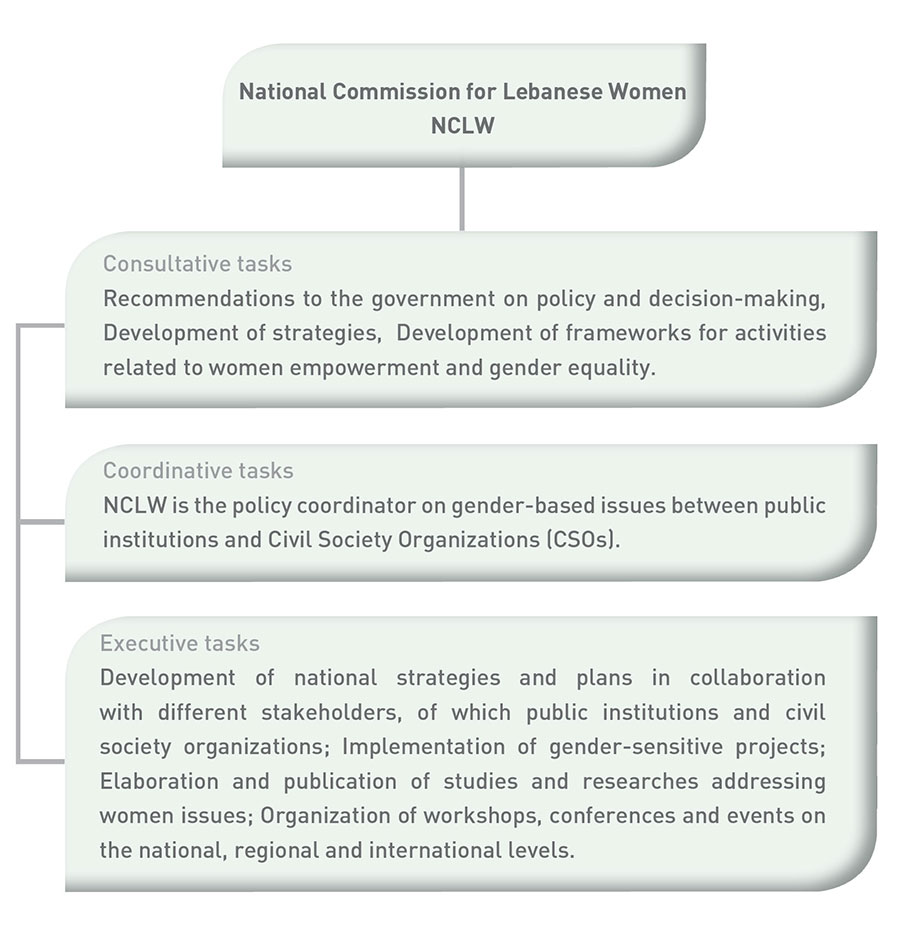Law of NCLW
The National Commission for Lebanese Women
Law Nº720 issued on November 5, 1998
The Establishment of the National Commission for Lebanese Women
The Parliament has hereby acknowledged, and
The President of the Republic has promulgated the law, the wording of which is hereinafter mentioned:
Article 1: The National Commission for Lebanese Women (NCLW) is established by the Presidency of the Council of Ministers.
Article 2 : NCLW’s General assembly gathers prominent activists in the field of women’s affairs.
Article 3 :
- The National Commission has a general assembly composed of at least 18 members and of at most 24 members, such members being nominated for a renewable period of three years by virtue of a decree passed according to the proposition of the Prime Minister;
- Shall be taken into consideration during the said members’ nomination, the profile aforementioned in Article 2 of this law.
- Shall chair NCLW the lady delegated by the President of the Republic.
- Female deputies and ministers shall during their term be considered ex-officio members of NCLW, and shall have a consultative status therein.
Article 4 : The Commission shall be entrusted with three types of missions :
- Consultation : NCLW shall act as consultative body of the Lebanese government and the other public administrations and institutions, on all issues relating to the status of women, or concerning the execution of measures and plans aiming at improving women’s condition, and ensuring equal opportunities between them and men. These missions shall comprise the drawing up of recommendations, and of proposals of integral plans to the government with the view of achieving the goals that have lead to NCLW’s constitution.
- Liaison and Coordination: Such mission is about linking and coordinating with all parties concerned with women’s affairs, i.e. the concerned various public institutions and administrations, and the various private and civil-society organisms, as well as Arab and international commissions and organizations.
Execution : This mission shall include as follows:
– Drawing proposals of national strategies for the advancement of women; and developing and amending strategies in effect whenever need be;
– Preparing and executing programs, action plans and activities related to women’s affairs, in collaboration with each party it deems fit among all public administrations and institutions and administrations, and the civil-society organisms, all of which being concerned with enhancing women’s status, and with following up on the implementation of the said activities;
– Conducting researches and issuing publications as well as promoting surveys and studies related to women;
– Organizing of or participating on the local, regional and /or international levels in ceremonies, expositions, workshops, seminars, and conferences, all of which tackling women’s issues.
Article 5 :
- NCLW’s General Assembly shall be entrusted with the task of electing 8 of its members to occupy posts in NCLW’s Executive Board.
- By a decision of the Prime Minister, the Treasurer of the Commission shall be nominated from the latter’s Executive Board members.
- The term of NCLW Executive Board ends simultaneously with the end of NCLW’s mandate, i.e. after a period of 3 years.
Article 6 : NCLW shall be asked to establish permanent or ad-hoc committees out of its members.
Article 7 : NCLW’s Budget stems from the annual financial contribution allocated to it in the Cabinet’s budget; it also comes from aids and donations that NCLW receives from local, foreign and/ or international non-governmental organizations and /or agencies.
Article 8 : NCLW shall draw up its bylaws within which it shall determine its mechanism of work, and its annual budget methods of elaboration, and of gaining the Cabinet’s approval ; it shall also draw up the regulations of its staff members, and specify conditions of their recruitment, and other allowances and benefits they are entitled to.
Likewise, NCLW shall adopt its financial regulations that will come into effect after their approval by the Prime Minister.
Article 9 : The details of the enforcement of this law shall be determined when necessary by decrees passed by the Cabinet.
Article 10 : This law shall come into effect upon its publication in the Official Gazette.
Baabda, on November 5, 1998
Signature of the President of the Republic: Elias EL HERAWI

